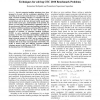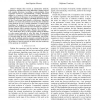928 search results - page 129 / 186 » Evolutionary algorithms and matroid optimization problems |
GECCO
2007
Springer
15 years 6 months ago
2007
Springer
The Negative Slope Coefficient (nsc) is an empirical measure of problem hardness based on the analysis of offspring-fitness vs. parent-fitness scatterplots. The nsc has been teste...
149
click to vote
CEC
2010
IEEE
14 years 11 months ago
2010
IEEE
Several constraint handling techniques have been proposed to be used with the evolutionary algorithms (EAs). According to the no free lunch theorem, it is impossible for a single c...
146
Voted
CEC
2009
IEEE
15 years 9 months ago
2009
IEEE
— Despite their success as optimization methods, evolutionary algorithms face many difficulties to design artifacts with complex structures. According to paleontologists, living...
161
Voted
JCM
2006
15 years 2 months ago
2006
Wireless sensor networks are widely adopted in many location-sensitive applications including disaster management, environmental monitoring, military applications where the precise...
111
click to vote
SAC
1998
ACM
15 years 6 months ago
1998
ACM
The fast messy genetic algorithm (fmGA) belongs to a class of algorithms inspired by the principles of evolution, known appropriately as "evolutionary algorithms" (EAs)....



